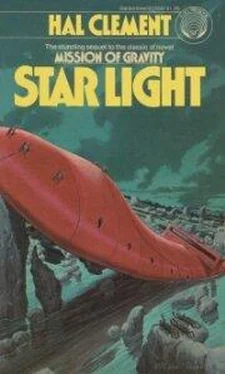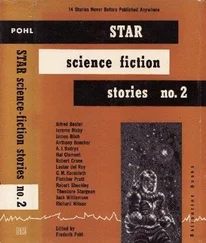“Type Three is very large, very dense, and very hard to account for. Theories which had the Type Ones losing their hydrogen because of their initially small mass, and the Twos keeping theirs because of their greater mass, were fine as long as we’d never heard of the Threes. Our ideas were perfectly satisfactory and convincing as long as we didn’t know too much, if you’ll forgive my sounding like my basic science teacher.
“Type Three is the sort you’re on. There are none of them around any sun with a Type One planet. I suppose there must be a reason for that, but I don’t know what it is. Well, nothing was known about them among the Community races until we learned to travel between stars and began to do it on a large scale, large enough so the principal interest of wandering ships wasn’t just new habitable planets. Even then we couldn’t study them first hand, any more than we could the Jovian worlds. We could send down a few special, very expensive and usually very unreliable robots, but that was all. Your species is the first we’ve ever encountered able to stand the gravity of a Type Three or the pressure of a Type Two, for that matter.
“But isn’t Mesklin a Type Three, by your description? You must know a lot about it by now; you’ve been in touch with our people for something like ten years, and some of you have even landed at the Rim, I mean the equator.
“More like fifty of our years. The trouble is that Mesklin isn’t a Type Three. It’s a peculiar Two. It would have had all the hydrogen of any Jovian world if it hadn’t been for its rotation, that terrific spin which gives your world an eighteen-minute day and a shape like a fried egg. There aren’t any others like it which we’ve found yet, and no intermediate cases that anyone’s recognized, or at least that I’ve heard of That’s why the Community races were willing to go to so much trouble and effort and spend so much time building up contact with your world and setting up this expedition to Dhrawn. We’ll find out a good deal in thirty years or so about that world’s makeup from the neutrino counters in the shadow satellites but the seismic equipment you people have been planting will add a lot of detail and remove a lot of ambiguity So will your chemical work. In five or six of your years we may know enough about that rock ball to make a sensible guess why it’s there or at least, whether it ought to be called a star or a planet.”
“You mean you only made contact with the people of Mesklin so you could learn more about Dhrawn?”
“No, I didn’t mean that at all. People are people and worth getting to know for their own sake — at least, both my parents feel that way, though I’ve met folks who certainly don’t. I don’t think the idea for the Dhrawn project got started until long after your College was under way My mother or Dr. Aucoin could tell you when. It was long before I was born. Of course, when it dawned on someone that you folks could make first-hand investigation of a place like Dhrawn, everyone jumped at the chance.”
This, of course, forced Beetchermarlf to ask a question which he would ordinarily have regarded as a strictly human affair and none of his business, like the matter of how mature a five-year-old should be. It slipped out before he caught himself; for over an hour thereafter he and Benj were arguing over the reasons for such activities as the Dhrawn project and why such a vast amount of effort should be devoted to an activity with no obvious material return in prospect. Benj did not defend his side too well. He was able to give the usual answers about the force of curiosity, which Beetchermarlf could see up to a point; he knew enough history to have heard how close man and several other species had come to extinction from energy starvation before they had developed the hydrogen fusion converter; but he was too young to be really eloquent. He lacked the experience to be able to point out convincingly, even to himself, the complete dependence of any culture on its understanding of the laws of the universe. The conversation never became heated, which would have been difficult in any argument where there is a built-in cooling-down period between any remark and its answer. The only really satisfactory progress made was in Benj’s mastery of Stennish.
The discussion was interrupted by Beetchermarlf’s suddenly becoming aware of a change in his surroundings. For the last hour his entire attention had been on Benj’s words and his own replies. The canted bridge and gurgling liquid had receded to the far background of his mind. He was quite surprised to realize abruptly that the pattern of lights twinkling above him was Orion. The fog had gone.
Alert once more to his surroundings, he noticed that the water line around the bridge seemed just a trifle lower. Ten minutes’ careful watching convinced him that this was so. The river war falling.
Part way through the ten minutes he had, of course, been queried about his sudden silence by Benj, and had given the reason. The boy had immediately notified McDevitt, so that by the time Beetchermarlf was sure about the changing water level there were several interested human beings on hand above to hear about it. The helmsman reported briefly to them on the radio and only then did he call through the speaking tubes for Dondragmer.
The captain was far aft, behind the laboratory section and just forward of the compartment containing the pressure bladder, when the call came. There was a pause after the helmsman finished speaking, and Beetchermarlf expected the captain to come bursting through the bridge hatchway after a few seconds; but Dondragmer did not yield to the temptation. The ports in the rest of the hull, including the compartment where he was, were much too small to permit a clear estimate of the water level, so he had to accept his helmsman’s judgment. Dondragmer was willing to do this, rather to the young sailor’s surprise.
“Keep track as exactly as you can of the rate of fall, until you are relieved,” was his order. “Let me and the human beings know the rate as soon as you can guess it reliably; tell us thereafter whenever you change your estimate.
Beetchermarlf acknowledged the order and clambered across the bridge to a point where he could mark the water line with a scratch on one of the window stanchions. Reporting the action to the captain and the human listeners, he returned to his station keeping his eyes fixed on the mark. The ripples in the liquid were several inches high, settling down only at rare intervals, hence it was some time before he could be at all sure of the change in depth. There were two or three impatient queries from above, which he answered politely in the best he could muster of his limited human language, before Benj reported that he was once more alone except for nonentities watching other cruisers. Most of the time thereafter until Takoorch arrived as bridge relief was spent by the two in describing their home worlds, correcting each other’s misconceptions about Earth and Mesklin by way of language practice and, though neither was fully aware of it, developing a warm personal friendship.
Beetchermarlf returned six hours later to let Takoorch go (actually the interval was twenty-four days by Mesklinite reckoning, a standard watch length) and found that the water was down nearly a foot from his reference mark. Takoorch informed him that the human Benj had just returned from a rest period. The younger helmsman wondered privately just how soon after Tak’s arrival the other had found it was time to take a rest. Naturally he could not ask such a question, but as he settled back into his station he sent a call radiating upward.
“I’m back on, Benj. I don’t know how recently Tak made a report to you, but the water is down over half a body length and the current seems much slower. The wind is nearly calm. Have your scientists anything to report?”
Читать дальше












